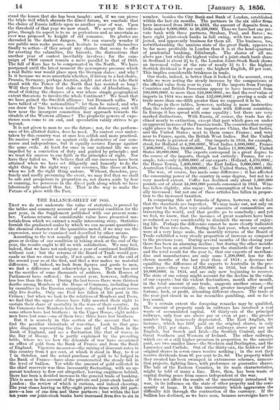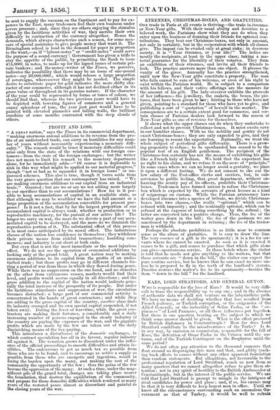THE BALANCE-SHEET OF 1855.
THAT we do not underrate the value of statistics, is proved by the tables and summary account of our material condition for the past year, in the Supplement published with our present num- ber. Various returns of considerable value have presented ma- terials from which we extract a really interesting story. Statistics furnish the graduated scales by which we can measure quantities ; the chemical character of the quantities meted, if we may use the expression, must be examined and described by other means.
According to the test usually applied for estimating the pro- gress or decline of our condition in taking stock at the end of the year, the results ought to fill us with satisfaction. We may feel, indeed, that we have not undergone a year of continued hostilities without cost ; but the returns of the Board of Trade would per- suade us that we stand nearly, if not quite, as well at the end of the second year as at the first, and that a war makes no material difference. If, indeed, we look from figures and goods to men, we find a difference and acknowledge a loss. The war has cost us the sacrifice of some thousands of soldiers. Both Houses of Parliament have suffered ; the second year, however, inflicting less loss than the first. During the last recess there were thirteen deaths among Members of the House of Commons, including four by casualties in the Russian campaign : during the present recess only five deaths. Only one Peer has fallen at his post in the Crimea ; but when we look to the relatives of Members and Peers we find that the upper classes have fully asserted their right t).) sustain their share of mortality in the wars of their country. In the Commons four Members have lost sons, and Lord Eleho and some others have lost brothers ; in the Upper House, eight noble- men have lost sons—one of them two ; three have lost brothers.
But it is scarcely in this section of the account that we find the peculiar vicissitude of war-time. Look to that gra- phic diagram representing the rise and fall of bullion in the Bauk of England, and see a fluctuation like that of waves in the Bay of Biscay. It is partly explained by the preceding table, where we see how the demands of war have occasioned an efflux of gold from the Bank of France and from the Bank of England. Vigorous measures—the raising of discount-rates in this country from 4 per cent, at which it stood in May, to 6 or 7 in October, and the actual purchase of gold to be lodged in the Bank of France—have alone counteracted the steady fall in the level of bullion. Yet while the amount of gold collected in the chief reservoir was thus incessantly fluctuating, with an ap- parent tendency to flow out altogether, leaving emptiness behind, there has been a decided increase in the general trade of banking. This is seen in the account of the private and joint-stock banks of London ; the review of which is curious, and indeed cheering. The year closes leaving us fifty-eight private firms with 201 part- ners—a loss of one firm and three partners ; but within the last ten years our joint-stock banks have increased from five to six in
number, besides the City Bank and Bank of London, established within the last six months. The partners in the six older firms have increased from 3013 to 4323, the amount of deposits from a little under 8,000,0001. to 26,338,0001. Thus we have lost one pri-
vate bank with three partners, Strahan, -Paul, and Bates ; we have eight joint-stock hanivi in full swing, with two more pro-
jected, and apparently business for them all. The business, too, notwithstanding the anxious state of the Freat Bank, appears to be far more profitable in London than it is at the head-quarters of prudential banking, Edinburgh. The shares of all are above par ; but while the highest value of a joint-stock bank share in Scotland is about 21 to 1, the London Joint-Stock Bank shows an increased value at the rate of nearly 31 to 1: the highest Scottish dividend is 9 per cent; the highest English, 25 per cent. This implies considerable briskness in trade. Our trade, indeed, is better than it looked in the account, even while we were noting the steady increase by the comparisons of the official value from year to year. If the imports from Foreign Countries and British Possessions appear to have increased from 100,000,0001. to more than 124,000,0001., we find the real value of imports in 1854 was more than 152,000,000/. ; proving a scale of trade more than one-fifth greater than we supposed it to be. Perhaps in these tables, however, nothing is more instructive than the relative amounts of our trade with different countries.
In Europe it has spread with some equality ; but there are very marked distinctions. With Russia, of course, the trade has de- clined nearly to extinction, except that part which goes on under an apparent increase of the Prussian trade. The countries that occupy eight places in the figures for imports are China, the East Indies, and the United States ; next to them comes France;.. and very
near to France, again' the British West Indies. But the United
States trade is greatest of all. Our imports in 1854, for example, stood, for Holland at 4,200,0007., West Indies 5,000,0001., France 7,400,0001., China 10,600,0001., East Indies 11,800,0001., United
States 30,000,0001. The exports correspond in a great degree to the course of the imports, though not entirely : France, for ex-
ample, takes only 3,000,0001. of our exports ; Holland, 4,570,0001.; the Haase Towns, 7,400,000/. ; the East Indies, 9,000,000/. ; the Australian Colonies, 10,600,000/. ; the United States, 21,000,000/. The war, of course, has made some difference ; it has affected the consuming power of the country in some degree, but not to a very marked extent. Coffee has declined only about 1,000,000 pounds out of about 34,000,000 pounds consumed in 1854. Wine has fallen slightly, also sugar ; the consumption of tea has actu- ally increased ; but not one of these articles has fallen in propor- tion to the increased taxation.
In comparing this set formula of figures, however, we all feel that the standards are imperfect. We may make out, not only on paper but in fact, that very similar amounts of commodities are traversing the world, and that profits go to somebody ; and yet we feel, we know, that the incomes of great numbers have been so reduced as very considerably to diminish the means of enjoy- ing life. Perhaps the difference cannot be more clearly indicated than by these two facts. During the last year, when our exports were at a very large scale, the monthly returns of the Board of Trade exhibited a very steady proportion of increase as compared to the previous year. During several months of the closing year there has been an alarming decline ; but during the other months there has been an actual increase upon the standards of the past ; and the total result for the year is, that our exports of merchan- dise and manufactures are only some 1,200,0001. less for the eleven months of the last year than of 1854 ; a decrease not equalling the difference of the exports to Australia in the pre- vious year—they were 12,870,0001. in 1853, but declined to 10,000,000/. in 1854, and are only now beginning to recover. The state of one colony might account for the decline in the value of our exports ; but the violent fluctuations, month after month, in the total amount of our trade, suggests another eause,—the much greater uncertainty, the much greater inequality of good fortune, luck, or profit, attending different classes. The trade of the year just closed in so far resembles gambling, and so far is less sound.
To a certain extent the foregoing remarks may be qualified. The amount of property sunk in railways has involved a real waste of accumulated capital. Of thirty-six of the principal railways, only four are above par or even at par ; the greater number being immensely depreciated. The East Anglian, for instance, which has 1001. paid on the original shares, is only
worth AV. per share. The chief railways above par are not English, but Scotch and Irish—the Scottish Central, and the
Great Southern and Western of Ireland. The other railways, which are at a still higher premium in proportion to the amount paid, are two smaller lines—the Stockton and Darlington, and the
Lancaster and Carlisle. Out of thethirty-me aiz , the holders of the original shares in seven eases receive nab' in the rest they
receive dividends from 9/. per cent to 2s. 6d. The property which
they created has been swamped in extraneous schemes, annexa- tion projects, fighting lines, with preference or .guarantee shares. The tale of the Eastern Counties, in its main characteristics, might be told of many a line. Here, then, has been waste of capital during peace from causes independent of the war.
It does not affect the results of the uncertainty introduced by war, in its influence on the state of other property and the com- munity at large. It is this uncertainty which aggravates- the difficulty felt through the contraction of the currency. If the bullion has declined, as we have seen, because sovereigns have to
be sent in supply the vacuum on the Continent and to pay for ex- penses n the East, many tradesmen feel their own business under severe pressure ; and, since they see others enjoying the stimulus given by the factitious activities of war, they ascribe their own difficulty to contraction of the currency altogether. Hence the demands, which always characterize such a season, for some mea- sure of special assistance to give people money that want it. The Birmingham school is loud in the demand for paper in proportion to the want,—as if " labour-notes " or " credit-notes " could serve the purpose of a sound currency ! Government has given a trifle to stay the appetite of the public, by permitting. the Bank to issue 475,0001. in notes, to make up for the lapsed issues of certain pri- vate bankers ; and the money-writer of the Times, we perceive, indicates the possibility that there may be an issue of one-pound notes—say 20,000,0001., which would release a large proportion of sovereigns, wheresoever they might be needed. The simple desire to substitute paper for gold indicates the more shifty cha- racter of our commerce, although it has not declined either in its gross value or throughout in its genuine nature. If the character of the year could be represented by forms or tones of colour, we should find that, whereas the two previous years would have to be depicted with towering figures of commerce and a general sunny splendour of tone, the year just past would have to be painted with elevated pinnacles and falling walls, the brilliant sunshine of some months contrasted with the deep clouds of others.











































 Previous page
Previous page